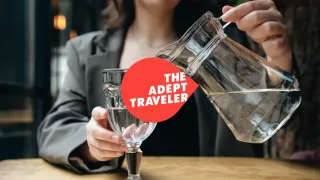Drinking Water Safety When Traveling: What You Need to Know

Traveling opens up a world of adventure and new experiences. But one thing that often gets overlooked is drinking water safety when traveling. Knowing where you can and can't drink tap water abroad is crucial for staying healthy. This article provides an overview of water safety in tourist areas across the globe. By understanding the risks and precautions, you can enjoy your trip without unwanted stomach troubles.
Understanding Global Water Safety
Water safety varies greatly from one country to another. In some places, tap water is perfectly safe to drink, while in others, it can be contaminated with harmful bacteria or parasites. Contaminated water risks include illnesses like diarrhea, cholera, and other waterborne diseases. It's important to research each destination's water quality before you go.
Developed countries often have strict water purification methods that make tap water safe. However, even in these places, the water may contain minerals or additives that your body isn't used to. Using a travel advisor can help you get up-to-date information on water safety in your destinations. They can provide personalized travel health tips to keep you safe.
General Guidelines for Travelers
No matter where you're headed, there are some general guidelines you should follow. First, always consider drinking bottled water recommendations. Bottled water is usually safe because it's sealed and hasn't been exposed to local contaminants. Make sure the seal is intact before you drink it.
Second, be cautious with ice cubes in your drinks. Ice is often made from tap water, which may not be safe. It's better to drink beverages without ice unless you're sure it's made from purified water. Third, when brushing your teeth or washing fruits and vegetables, use bottled or boiled water. Boiling water advice suggests that bringing water to a rolling boil for at least one minute can kill most harmful organisms.
Water Safety in Tourist Areas
Tourist areas sometimes have better water treatment facilities than rural regions. However, this isn't always the case. Even in popular destinations, tap water safety can't be guaranteed. For example, in some parts of the Caribbean and Mexico, it's recommended to avoid tap water altogether. Always check local advisories and consult travel health tips specific to the area.
In hotels and resorts, they might provide safe drinking water or have water filters installed. But don't assume-ask the staff about the water safety. In places where tap water isn't safe, they usually inform guests, but it's better to be sure. Remember that swimming pools are generally safe because they contain chlorine, but avoid swallowing the water.
Using Water Purification Methods
If you're an adventurous traveler visiting remote areas, you might need to purify your own water. Water purification methods include using water filters for travel, purification tablets, or UV light devices. These tools can remove or kill bacteria and parasites, making the water safer to drink.
Filters are great for removing particles and some organisms, but they may not eliminate all viruses. Purification tablets often contain iodine or chlorine and can kill most pathogens. UV light devices use ultraviolet light to sterilize water quickly. Before using any method, read the instructions carefully to ensure it's effective.
The Role of a Travel Advisor
Navigating water safety can be complicated, especially when visiting multiple countries. A travel advisor can provide valuable insights into the water conditions of your destinations. They stay updated on the latest advisories and can recommend the best travel water precautions. This support can make your trip safer and more enjoyable.
Travel advisors can also help you plan for any necessary vaccinations or medications. They might suggest packing certain items like water purification tablets or recommending specific brands of bottled water available locally. With their expertise, you can focus on enjoying your trip rather than worrying about getting sick.
Final Thoughts
Understanding where you can and can't drink the water when traveling is essential for a healthy trip. By following general guidelines and using water purification methods when necessary, you can minimize contaminated water risks. Always stay informed about tap water safety in your destinations, and don't hesitate to seek advice from a travel advisor. Safe water consumption is a key part of travel, ensuring that your adventures are memorable for all the right reasons.
